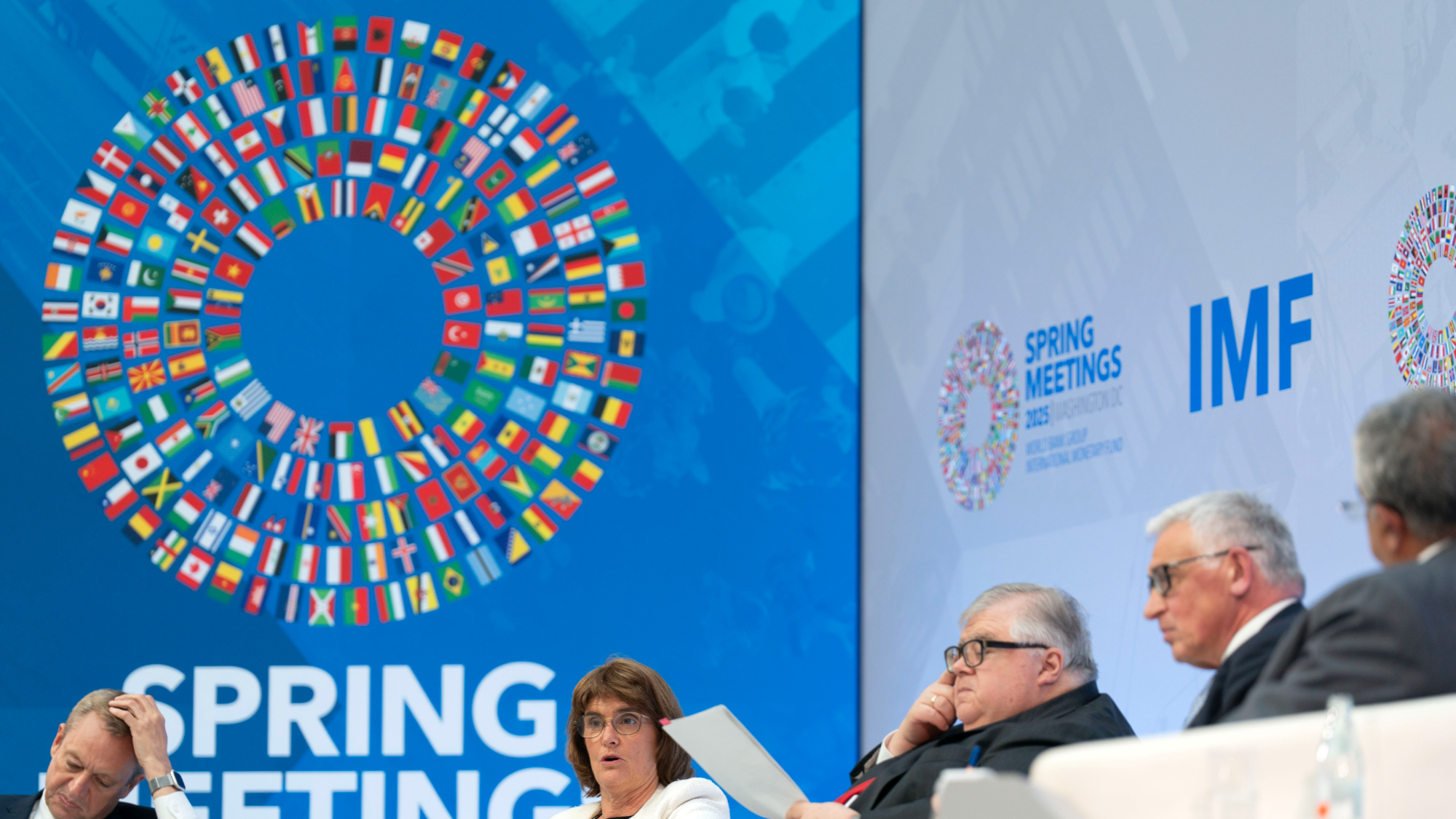
WASHINGTON - At the ongoing Spring Meetings of the International Monetary Fund (IMF) and the World Bank Group (WBG), "tariff" and "trade" have become keywords in several events and multiple reports.
Delegates from Africa, Latin America, Europe and other regions expressed in conversations with Xinhua that, under the shadow of tariffs, concerns are spreading globally, and uncertainty is expected to weigh on global economic growth.
In a blog on the global economy published on Tuesday, IMF Chief Economist Pierre-Olivier Gourinchas mentioned the word "tariff" 21 times and "trade" 16 times, underscoring the importance of these topics.
During a World Bank panel discussion on job creation on the same day, World Bank Group President Ajay Banga was asked about tariffs and trade issues, reflecting widespread concerns over rising tariffs and escalating trade conflicts.
Lyle Enrico Dennis works in marketing for a Brazilian company exporting to the United States. When asked about his primary concern regarding the global economy, he responded without hesitation: "Trade issues."
ALSO READ: South Korea’s economy shrinks as tariffs darken global outlook
Dennis told Xinhua that the Brazilian company he works with exports various agricultural products, wood, marble, etc. They had originally planned to open an import facility in the United States. "Now we've looked at it financially, it's not feasible for us to do so if the tariffs are going to be as high as they indicated," he said.
Goodman Chakanyuka is the executive director of credit risk at the Trade and Development Bank, an African regional development finance institution.
He told Xinhua that his primary concern at the moment is trade issues, or tariff issues. Some member countries of the regional bank are "big exporters" to the United States. "With those kind of high tariffs, I think it's likely to impact their capacity to do more," he said.
A European delegate, who declined to disclose his name, also expressed deep concerns about the tariff wars. He told Xinhua that the world is a small village, and the ripple effects of price increases caused by tariffs are spreading worldwide.
"So it will be a long chain of increase in prices, and at the end of the day, it's the poor citizen who will pay for it," he said.
The concerns of the delegates were also reflected in several reports released during the Spring Meetings. In the latest World Economic Outlook (WEO) report, the IMF downgraded the global economic growth forecast for 2025 to 2.8 percent, 0.5 percentage points lower than the projection made in January.
Noting that this on its own is a "major negative shock," the IMF said in the report that the "unpredictability" with which these measures have been unfolding also has a negative impact on economic activity and the outlook.
ALSO READ: FT: Trump to exempt some auto tariffs
The IMF's latest Global Financial Stability Report (GFSR) shows that global financial stability risks have grown significantly, driven by tighter financial conditions and heightened trade and geopolitical uncertainties.
The latest Fiscal Monitor, meanwhile, said that if fiscal revenues and economic output decline more than currently projected due to higher tariffs and weak economic growth prospects, the global public debt situation could worsen further.
"Trump's tariffs and retaliation will both slow world growth and undermine the US role in the world economy," Dean Baker, a senior economist at the Center for Economic and Policy Research, told Xinhua via email.
"Not only are the tariffs themselves bad for growth, the uncertainty around them creates a terrible environment for investment," said Baker.
As the initiator of the trade war, the United States is expected to face severe impacts. The IMF forecasts that US economic growth will slow to 1.8 percent this year, 0.9 percentage points lower than the January projection, marking the largest downward revision among advanced economies. The main reasons for the downgrade are "greater policy uncertainty, trade tensions, and softer demand momentum."
In addition, the status of US Treasury bonds and the US dollar as global safe-haven assets is facing challenges.
"It has already begun, because of the BRICS. I mean, that is a global and will be seen as a global currency, and the US dollar might take a second seat or even a third seat, depending on what the African economic development is going to be and its currency," said Dennis.
Looking ahead, Dennis expressed some optimism. He said that if the US market remains closed, the Brazilian company he works with will turn to markets in Canada and Southern countries to seek business opportunities.
When talking about the future, Chakanyuka is more concerned. "Unfortunately, for most African countries, they don't have the bargaining powers. They are more on the receiving end. So it's very difficult to influence some of these changes at the global place," he said.
"What is happening now it's a lose-lose (situation), what people need to fight for is a win-win," Chakanyuka said.
At a press conference on Thursday, IMF Managing Director Kristalina Georgieva said that significant shifts in trade policies have led to a sharp increase in uncertainty, calling on countries to engage in constructive cooperation and resolve trade disputes promptly.
"A trade policy settlement among the main players is essential, and we are urging them to do it swiftly, because uncertainty is very costly," Georgieva said.


